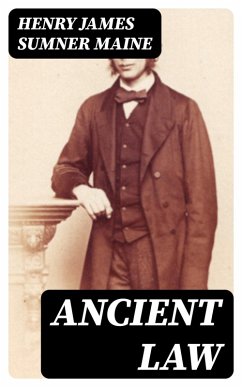In "Ancient Law," Henry James Sumner Maine presents a pioneering analysis of the evolution of legal systems from ancient to modern times. Employing a comparative and historical approach, Maine elucidates the relationship between law and society, emphasizing the importance of social structures in shaping legal principles. Through a series of essays, he explores the transition from status-based laws of ancient societies to the contractual and individualistic frameworks of modern legal systems, thus situating law within its broader cultural and historical context. Maine's elegant prose blends rigorous scholarship with a philosophical inquiry that invites readers to reflect on the nature of law itself. Henry James Sumner Maine, a prominent legal scholar and historical thinker, was deeply influenced by his time in India as a member of the Indian Civil Service. His exposure to different legal traditions and his background in Roman law significantly informed his views on the interplay of custom, law, and societal progress. This duality of experience led him to advocate for a more nuanced understanding of legal evolution as a reflection of social development. "Ancient Law" is essential reading for scholars of law, history, and sociology alike. Its insights into the foundational aspects of legal theory resonate throughout contemporary discussions of justice and the rule of law. Maine's work not only enriches our comprehension of legal history but also prompts essential questions about the roots of our modern legal systems. Readers seeking a profound and thought-provoking exploration of law's ancient origins will find Maine's arguments both compelling and illuminating.
Dieser Download kann aus rechtlichen Gründen nur mit Rechnungsadresse in A, B, BG, CY, CZ, D, DK, EW, E, FIN, F, GR, H, IRL, I, LT, L, LR, M, NL, PL, P, R, S, SLO, SK ausgeliefert werden.









